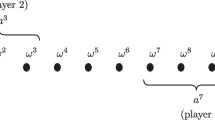Abstract
When there is one buyer interested in obtaining a service from one of a set of sellers, multi-attribute or multi-issue auctions can ensure an allocation that is efficient. Even when there is no transferable utility (e.g., money), a recent qualitative version of the Vickrey auction may be used, the QVA, to obtain a Pareto-efficient outcome where the best seller wins. However, auctions generally require that the preferences of at least one party participating in the auction are publicly known, while often making this information public is costly, undesirable, or even impossible. It would therefore be useful to have a method that does not impose such a requirement, but is still able to approximate the outcome of such an auction. The main question addressed here is whether the Pareto-efficient best-seller outcome in multi-issue settings without transferable utility (such as determined by the QVA) can be reasonably approximated by multi-bilateral closed negotiation between a buyer and multiple sellers. In these closed negotiations parties do not reveal their preferences explicitly, but make alternating offers. The main idea is to have multiple rounds of such negotiations. We study three different variants of such a protocol: one that restricts the set of allowed offers for both the buyer and the seller, one where the winning offer is announced after every round, and one where the sellers are only told whether they have won or not after every round. It is shown experimentally that this protocol enables agents that can learn preferences to obtain agreements that approximate the Pareto-efficient best-seller outcome as defined by the auction mechanism. We also show that the strategy that exploits such a learning capability in negotiation is robust against and dominates a Zero Intelligence strategy. It thus follows that the requirement to publicly announce preferences can be removed when negotiating parties are equipped with the proper learning capabilities and negotiate using the proposed multi-round multi-bilateral negotiation protocol.
Similar content being viewed by others
References
Beil D, Wein L (2003) An inverse-optimization-based auction mechanism to support a multiattribute RFQ process. Manag Sci 49(11): 1529–1545
Bichler M, Lee J, Lee H, Chung J (2001) Absolute: an intelligent decision making framework for e-sourcing. In: Proceedings of the 3rd international workshop on advanced issues of e-commerce and web-based information systems, San Jose, CA, pp 195–201
Che Y (1993) Design competition through multidimensional auctions. RAND J Econ 24(4): 668–680
David E, Azoulay-Schwartz R, Kraus S (2002) Protocols and strategies for automated multi-attribute auctions. In: Proceedings of the 1st international joint conference on autonomous agents and multiagent systems. ACM, New York, pp 77–85
Faratin P, Sierra C, Jennings NR (2003) Using similarity criteria to make negotiation trade-offs. J Artifici Intell 142(2): 205–237
Gode DK, Sunder S (1993) Allocative efficiency in markets with zero intelligence traders: market as a partial substitute for individual rationality. J Politi Econ 101(1): 119–137
Harrenstein P, Mahr T, de Weerdt MM (2008) A qualitative vickrey auction. In: Endriss U, Paul WG (eds) Proceedings of the 2nd international workshop on computational social choice. University of Liverpool, pp 289–301
Harrenstein P, de Weerdt MM, Conitzer V (2009) A Qualitative vickrey auction. In: Proceedings of the ACM conference on electronic commerce. ACM Press, pp 197–206
Hindriks KV, Tykhonov D (2008a) Opponent modelling in automated multi-issue negotiation using bayesian learning. In: Proceedings of the 7th international conference on autonomous agents and multiagent systems, pp 331–338
Hindriks KV, Tykhonov D (2008b) Towards a quality assessment method for learning preference profiles in negotiation. In: Proceeding of workshop on agent-based complex automated negotiations, pp 64–71
Hindriks KV, Tykhonov D, de Weerdt MM (2008) Approximating an auction mechanism by multi-issue negotiation. In: Hindriks KV, Brinkman WP (eds) Proceedings of the 1st international working conference on human factors and computational models in negotiation, pp 33–38
Kjerstad E (2005) Auctions vs negotiations: a study of price differentials. Econometrics Health Econ 14(12): 1239–1251
Li C, Giampapa J, Sycara K (2004) Bilateral negotiation decisions with uncertain dynamic outside options. In: Proceedings of 1st IEEE international workshop on electronic contracting, pp 54–61
Nguyen TD, Jennings N (2003) Concurrent bilateral negotiation in agent systems. In: Proceedings of 14th international workshop on database and expert systems applications, pp 844–849
Osborne MJ, Rubinstein A (1994) A course in game theory. MIT Press, Cambridge
Parkes D, Kalagnanam J (2005) Models for iterative multiattribute procurement auctions. Manag Sci 51(3): 435–451
Rahwan I, Kowalczyk R, Pham H (2002) Intelligent agents for automated one-to-many e-commerce negotiation. In: Proceedings of 25th Australasian conference on computer science, Australian computer society, Inc., Darlinghurst, Australia, pp 197–204
Sandholm T (2007) Expressive commerce and its application to sourcing: how we conducted $35 billion of generalized combinatorial auctions. AI Mag 28(3): 45–58
Teich JE, Wallenius H, Wallenius J, Koppius OR (2004) Emerging multiple issue e-auctions. Eur J Oper Res 159(1): 1–16
Teich JE, Wallenius H, Wallenius J, Zaitsev A (2006) A multi-attribute e-auction mechanism for procurement: theoretical foundations. Eur J Oper Res 175(1): 90–100
Thomas CJ, Wilson BJ (2005) Verifiable offers and the relationship between auctions and multilateral negotiations. Econ J 115(506): 1016–1031
Vickrey W (1961) Counterspeculation, auctions, and competitive sealed tenders. J Finance 16(1): 8–37
Author information
Authors and Affiliations
Corresponding author
Rights and permissions
About this article
Cite this article
Hindriks, K.V., Tykhonov, D. & de Weerdt, M.M. Qualitative One-to-Many Multi-Issue Negotiation: Approximating the QVA. Group Decis Negot 21, 49–77 (2012). https://doi.org/10.1007/s10726-009-9186-6
Published:
Issue Date:
DOI: https://doi.org/10.1007/s10726-009-9186-6




